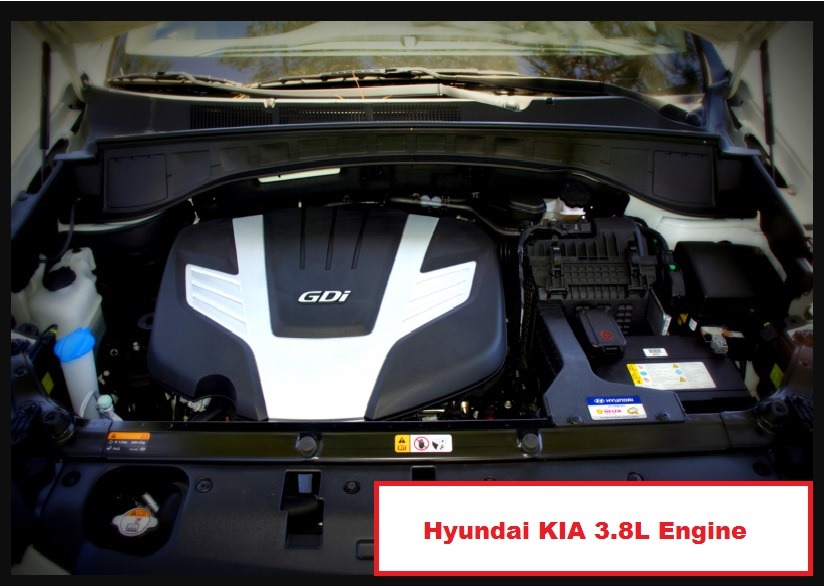Hyundai KIA 3.8L Engine Specs, Problems & Reliability
Hyundai KIA 3.8L Engine
Here in this post, I have gathered information about the Hyundai KIA 3.8L Engine from its official website, including its specifications, Problems, and Reliability.
We believe in providing reliable information to our readers, therefore we prefer to obtain information on the Hyundai KIA 3.8L Engine from authentic sources.
This article, which has been updated, has all the information you require about the Hyundai KIA 3.8L Engine.

The Kia 3.8-liter engine is a naturally aspirated V6 with direct fuel injection; its other name is the Hyundai Lambda GDI engine.
Many of Hyundai and Kia’s finest vehicles have relied on the 3.8-litre unit, the largest and most powerful in the Lambda family, since its debut in 2005.
The 3.8-litre engine is standard in many Hyundai and Kia cars, including sedans, SUVs, and full-size minivans, and it produces roughly 291 horsepower at 6,000 rpm and 262 pound-feet of torque at 5,200 rpm.
However, there are several issues that are unfortunately inevitable with such a powerful engine. Therefore, this manual will cover the dependability of the GDI.
| Engine | Hyundai Lambda II RS GDI/MPI |
| Displacement | 3,778 cc (3.8L) |
| Configuration | V6 |
| Aspiration | Natural |
| Head/Block Material | Aluminium |
| Valvetrain | DOHC, 24 valve |
| Bore x Stroke | 96mm x 87mm |
| Compression Ratio | 10.4 : 1 (MPI), 11.5 : 1 (GDI) |
| Horsepower | 286-348 HP |
| Torque (lb-ft) | 264-295 TQ |
| Manufacturer | Hyundai Motor Co. |
| Production years | 2005-present |
| Cylinder block material | Aluminium |
| Cylinder head material | Aluminium |
| Fuel type | Gasoline |
| Fuel system | Multi-point fuel injection; |
| Direct injection | Configuration |
Hyundai KIA 3.8L Engine Problems & Reliability
Carbon suffocation
The 3.8-litre engine suffers from the same carbon accumulation problem as other direct-injection engines.
Although direct injection is a tremendous technological advancement, it is sad that it results in oil blow-by during operation.
As the oil accumulates on the ports and valves, it limits airflow and negatively impacts the driving experience.
Poor performance, misfiring, rough idling, power loss, or a sputtering engine are all signs of this issue.
But it can be hard to figure out where the problem is coming from, and you may drive thousands of extra miles before you notice that the extra carbon is making your driving worse.
Valve buildup can be effectively removed by blasting the valves every 100,000 miles.
If you want this done, you can take your car to a skilled mechanic.
Oil Spill
Kia 3.8-liter engines frequently experience oil leaks as well. The proper installation of new parts is all that’s needed to rectify problems with some Lambda engines caused by oil filter components.
After 100,000 miles, oil leaks from the oil pan gasket, valve cover gasket, or main seal are commonplace.
It is important to check for oil leaks if you notice any dripping, smoke, or burning oil odour. Alternatively, you can check on this issue every time you get an oil change.
The leak in your Kia or Hyundai can be fixed at the service station before it gets any worse.
High oil consumption in the Lambda 3.8 engine is typically the result of jammed piston rings.
Maintaining a regular oil change schedule and getting regular checkups at the mechanic can keep you from spending a ton of money on motor oil.
The Hyundai 3.8L engine has the same issues as the Lambda engine series’ 3.3L V6. Some of these issues include excessive oil consumption, a propensity for blocked piston rings, and the usual carbon buildup issues seen with direct-injected engines.
Read our in-depth analysis of the Lambda 3.3L engine for more details.
The 3.8-liter Lambda MPI can travel over 180,000 miles before it needs to be replaced (300,000 km). In terms of speed, the GDI variant will require fewer system resources.
Hyundai KIA 3.8L Engine Review
The Hyundai-Kia 3.8L Lambda V6 engine has gained a solid reputation as a reliable power source since its production debut in 2006. It’s prized for its seamless power delivery, commendable fuel efficiency, and enduring reliability. For a full review, please check this YouTube video Here.
Hyundai KIA 3.8L Engine FAQ
With a reliability rating of 3.5 out of 5, the Hyundai Genesis Coupe places sixteenth out of thirty-one in the category of premium midsize automobiles.
The 3.8-litre V6 engine provides reasonable power, with outputs of 286-348 hp and 264-295 lb-ft. It’s a reliable engine that gets great mileage for the money.
1997-2003 Buick Regal.
2000-2003 Chevrolet Impala.
1998-1999 Chevrolet Lumina.
1998-2003 Chevrolet Monte Carlo.
1998-1999 Oldsmobile Intrigue.
1997-2003 Pontiac Grand Prix.
The Hyundai/Kia 3.8L engine has been used in a variety of cars, including the Kia Optima, Kia Sorento, Hyundai Genesis, and Hyundai Santa Fe.
The power output of the Hyundai/Kia 3.8L engine varies based on the year of manufacture and the application. But, the majority of models generate between 250 to 300 horsepower.
The fuel efficiency of the Hyundai/Kia 3.8L engine varies based on the model year and use. Most models reach an EPA-estimated fuel efficiency rating of 19-24 mpg when in the city and 26-30 miles per gallon when driving.
The torque output for the Hyundai/Kia 3.8L engine varies based on the year of manufacture and application. But, the majority of models are capable of producing between 250 to 300 lb-ft of torque.
Its Hyundai/Kia 3.8L engine has been regarded as a reliable engine. However, there have been engine failures, particularly in the early models.
The most common problems with the Hyundai/Kia 3.8L engine include: Engine misfires, Timing chain problems, Oil consumption, Head gasket problems